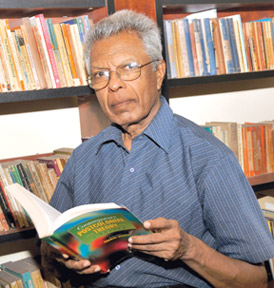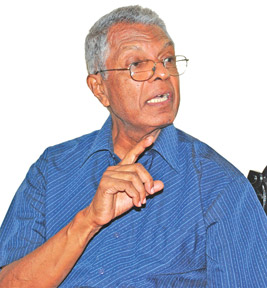Quality critique
ENCOUNTER OF THE WEEK
Sajitha PREMATUNGE
Let’s set the record straight. As early as 1991 he proposed a
general English course for A-Ls. He is probably the first of his kind to
embark on the hitherto unexplored area of language planning in his
Learning English, before he changed his line of research to literary
criticism. These are little known facts about Prof D C R A Goonetilleke,
Emeritus Professor of English, University of Kelaniya.
“Bogus reputation is easy to come by at
local level - Prof D C R A Goonetilleke”
Prof Goonetilleke’s works
 |
|
Prof Goonetilleke is one of the very
few internationally acclaimed critics on postcolonial
literature.Picture by Saman Sri Wedage |
*Developing Countries in British Fiction
(1977) Introducing English Literature in 3 Volumes Volume I - First
Steps to Literary Criticism (1975) Volume II - A Study of Fiction
(1976), Volume III - A Study of Poetry (1977) *Modern Sri Lankan
Stories: An Anthology (1986) *Between Cultures: Essays on Literature,
Language and Education (1987) *Modern Sri Lankan Poetry: An Anthology
(1987) *Images of the Raj: South Asia in the Literature of Empire (1988)
*Learning English: Book One (Co-author) (1988; revised in 2010) *Joseph
Conrad: Beyond Culture and Background (1990) *Modern Sri Lankan Drama:
An Anthology (1991) *The Penguin New Writing in Sri Lanka (1992) *Joseph
Conrad: Heart of Darkness (1995; revised 2007) *The Penguin Book of
Modern Sri Lankan Stories (1996) * Sri Lankan Literature in English
1948-1998: A 50th Independence Anniversary Anthology (1998) *Salman
Rushdie (1998) *Perspectives on Post-Colonial Literature (2001) *Sri
Lankan English Literature and the Sri Lankan People 1917 – 2003 (2005)
*Kaleidoscope: An Anthology of Sri Lankan English Literature (2007)
*Joseph Conrad’s Heart of Darkness (2007) *Learning English: Book II
(Co-author) (2009) *Salman Rushdie: Second Edition (2010) *Kaleidoscope:
An Anthology of Sri Lankan English Literature, Volume II (2010)
He can be termed a versatile critic in it that he is comfortable
dealing with both mainstream and post colonial literature. He is one of
the very few internationally acclaimed critics not only on postcolonial
literature, but is considered an authority on such Western writers as
Joseph Conrad and Asian writers as Salman Rushdie. When he started
publishing with major publishers, he blazed a trail for the younger
academics to follow, which unfortunately so few have. In an interview
Daily News Artscope explored Prof Goonetilleke’s many areas of
expertise.
Q: Sri Lankan English literary criticism has not evolved on
par with literature, why?
A: Sri Lanka has failed to evolve an independent literary
tradition. The crux of the problem is that the literary community in Sri
Lanka is so small that everybody knows each other.
There is close interaction between the poets, writers, playwrights
and critics within the circle. Consequently any form of literary
criticism, whether it is reviews, publications, tend to be either biased
or prejudiced depending on the relationship between the writer and the
critic.
Sri Lankan English literature has not had enough time to evolve. It
really got off ground in the 50’s and 60’s. Our English literary
tradition is only about 50 years old. Where publishing is concerned,
although it is quite possible to publish abroad while residing in Sri
Lanka, no critics have published their work with major international
publishers.
As for literature, with the sole exception of the recent novel
Chinaman: The Legend of Pradeep Mathew by Shehan Karunatilaka, no other
writer has been able to publish with a prestigious Western publisher.
One of the reasons for literary criticism in Sri Lanka to be so far
behind the rest of the world may be that there is so little research on
mainstream literature.
The existing few researchers are not up to competition with the best
critics on mainstream literature that the west has to offer. On the
other hand a majority of the younger academics focus on postcolonial
literature. One would think that Sri Lankan academics would be able to
compete with Western academics regarding Asian, African and West Indian
literary criticism, but from the looks of it even post colonial literary
criticism is monopolized by western academics.
Sri Lankans have not been able to make headway in the west due to
lack of quality. It is easy enough to acquire a local reputation as a
critic through easy publicity. However it is quite tough even for an
established critic to get published in the West because leading
publishers adhere to a rigorous system of quality assurance.
Local critics do not aspire for hard earned publicity at the
international level because a bogus reputation is so easy to come by at
local level.
Q: Are we giving unwarranted precedence to English, a language
that has existed in Sri Lanka as a second language for more than six
decades?
A: Self aggrandizing linguists are making an artificial issue
out of English. Sri Lankans will invariably speak in a Sri Lankan
manner. One only has to be rooted in Sri Lanka to do so. Most Sri Lankan
linguists have a one track marginal research interest in Sri Lankan
English, without undertaking the more challenging task of subjects
central to linguistics. What Sri Lanka requires is a form of
international English that we all speak.
Q: Must the medium of language in English literature always be
influenced by the vernacular?
A: The creative writer must always be at liberty to choose his
or her own language, whether it be coloured with vernacular idiom or
exclusively English. Language in literature will be invariably decided
by what the writer intends to convey. And what the writer wants to
communicate will find the language appropriate to it. It all depends on
the personality of the writer.
Expatriates can use the many cultures that have influenced them. Even
Sri Lankans, through media, are subject to many influences. But there is
something that is identifiable about a Sri Lankan as a Sri Lankan.
Whatever the mix is in the man makes him different from others of
foreign cultures and distinctively Sri Lankan. If one cultivates a
pseudo European perspective the resulting literature or literary
criticism will be a failure. What is important is for the writer to be
rooted in Sri Lankan culture. Only then can literature be truly Sri
Lankan. Language is secondary.
Q: Why is there a dearth of English Science fiction in Sri
Lanka?
A: There has been some Science Fiction by writers the calibre
of Harsha Wasalathanthri and Priyanthi Wickramasuriya. It is not so easy
to pull off credible science fiction. In fact Salman Rushdie’s first
novel Grimus, was a science fiction. Although he is an extremely
talented writer he failed at science fiction.
Q: Is the Sri Lankan writer’s attempt to recreate Sri Lankan
village life a miserable failure?
A: Village-well literature evolved as a result of an attempt
by the alienated Sri Lankan English writer to reconnect with rural
village life in the 60’s and the early 70’s.
 |
|
D C R A
Goonetilleke.
Picture by Ranjith Asanka |
Sri Lankan literature has come a long way since then. Now our writers
deal with all manner of experiences and milieu.
Q: Western literature has portrayed eastern cultures as
inferior, at times even tribal and savage. Is this still so?
A: During the colonial period the cultures of developing
countries were looked down upon. However even during these times there
were western writers who were independent enough to rise above this
view.
Even the highly acclaimed Leonard Woolf’s Village in the Jungle, when
read between the lines, is rather racist. This ‘Orientalism’ still
exists to some extent.
This is never clearer than in the way in which the West considers our
terrorist problem. Some leaders of the western world still treat us like
a colony.
Q: Are expatriate writers to some degree responsible for
misrepresenting Sri Lankan culture?
A: Most expatriate writers such as Romesh Gunasekera still
share these western prejudices. His Reef for example betrays clearly
‘Orientalist’ tendencies. Such novels are even shortlisted for
prestigious awards such as the booker prize for looking down on Sri
Lankan culture because this suited the western taste.
Q: Is feminism in Sri Lankan literature a result of western
influence?
A: Sri Lankans have never needed emancipation. It is the
western women who needed it.
Sri Lankan women were emancipated long before. Now westerners trying
to emancipate our women is preposterous.
Q: Should literature always reflect the socio-political tide?
A: Sri Lankan writers have generally been sensitive to
contemporary events. Consequently Sri Lankan literature has been able to
project images of the major socio-political incidents.
However good literature can at times afford to be quite conservative
and go against the tide. The Augustans for example, produced some very
good, yet conservative literature. One’s political standpoint does not
necessarily have to influence the quality of one’s literature.
A writer can produce literature from a conservative, radical, left
wing or right wing perspective and still produce good literature.
Q: The body of conflict literature is less rich as opposed to
that of the insurgency. Please comment.
A: The insurgency, although short-lived, produced works of
great quality, such as Sarachchandra’s Curfew and A Full Moon and Raja
Proctor’s Waiting for Surabiel.
However the LTTE terrorist problem also stimulated books of quality
such as David Blacker’s The Blacklight Arrow and Suvimalee Karunaratne’s
The Vine.
The insurgency made such a great impact because it was the first
organized uprising against the government of the day.
However the LTTE terrorist problem went on for longer and in terms of
sheer volume produced far more literature.
Q: Is it not ironical and even a paradox that Sri Lankan
‘English’ literature arose out of a nationalist current that resulted in
an identity crisis of Sri Lankan English writer?
A: The nationalist current in the 1950’s and 60’s did not
affect all the writers. For example Patrick Fernando wrote good poetry
as if the nationalist current did not exist. Then again the nationalist
current was what forced some writers to return to the village.
The nationalist current was not positively received by English
writers in Sri Lanka. They reacted negatively to it in fear of being
dislodged from their positions. In doing so they became more aware of
their own cultural, social and political positions. This was what drove
them to write. So it is sort of a paradox.
Q: You have said in Sri Lankan literature in English that
there is nothing ‘ethnic’ about the LTTE issue. Please comment.
A: The LTTE terrorist problem was not really a conflict
between the Sinhala and the Tamil. In fact it was not a racial problem
at all.
‘The fifty-fifty campaign’ as it came to be known, was a problem
created by Tamil politicians in 1937, when they demanded representation
in the State Council equal to the Sinhala in the new dispensation.
This was what initially unleashed separatist violence. The campaign
then changed hands to the extremist militant group that was LTTE, which
resulted in the terrorist problem.
They even killed their own moderates such as Lakshman Kadirgamar. The
conflict was never between the Sinhala and Tamil races, but between a
group of terrorists and the state.
Q: Some claim that your work are subjective and even
prejudiced, please comment.
A: Good literary criticism has to be subjective. It is
required of a critic to form his or her own opinion, which is reflected
it in his or her work.
One has to have his own convictions to produce literary criticism.
I would not say I am prejudiced, but I try to be independent. I do
not take into account the seniority of a writer. Whether they are
veterans or novices I judge them on their merits. |



